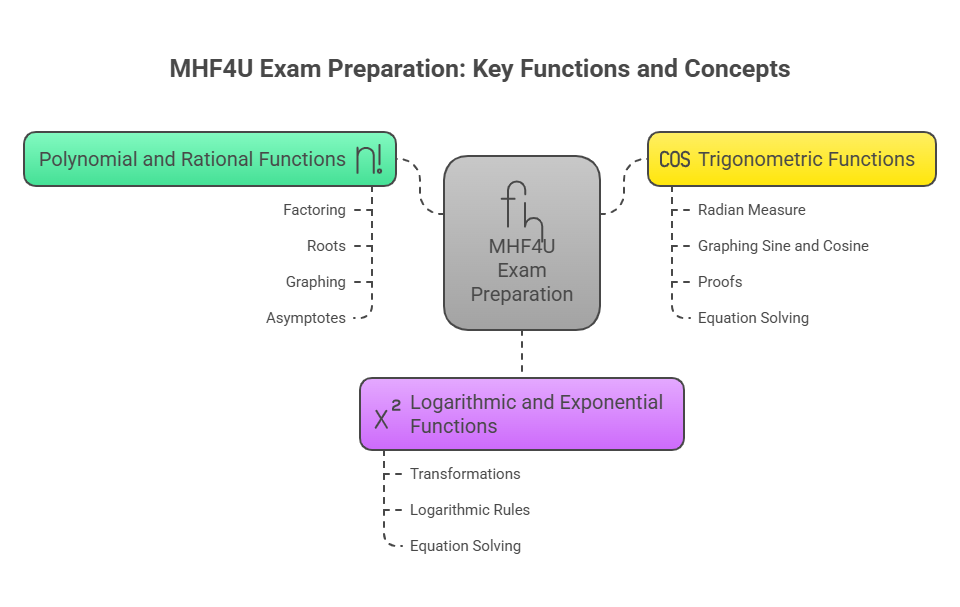Key Highlights of MHF4U Practice Exam
- The MHF4U final exam is one of the most important parts of the Grade 12 Advanced Functions course in Ontario.
- You need to be strong at working with polynomial functions, rational functions, logarithmic functions, and trigonometric functions.
- To get ready for the mhf4u final exam, make a study guide, work on past mhf4u exam questions, and use your time well.
- A practice exam can help you find what you do not know and make you feel better before you take the final test.
- If you want to do well, focus on the main ideas, stay away from common mistakes, and use things like online worksheets and official curriculum guides as part of your advanced functions exam preparation.
Introduction
Welcome to your guide to doing well on the Grade 12 Advanced Functions exam. Now that you are near the end of your MHF4U course, you will start thinking more about the final test. Good mhf4u test prep is very important for getting a good mark. This article is here to help you with your advanced functions exam preparation. You will learn about how the exam is set up, what topics are on it, and some helpful ways to study. If you use an MHF4U Practice Exam, you will be ready for what will come on test day and can feel sure of yourself.
MHF4U Practice Exam Overview and Importance
An MHF4U Practice Exam is a mock test that is made to be just like the real final exam in your Grade 12 Advanced Functions course. It has mhf4u exam questions that match the look, type, and difficulty of the real test. When you take a practice test, you do more than look over notes. You get to use what you know, and do it with the same pressure you feel on the final exam.
This tool is a key part of getting ready. It shows you what topics you get and which ones you still need to check before the final exam. Below, you will see what is on these practice tests and why using them can be good for your success.
What the MHF4U Practice Exam Covers
The MHF4U practice exam covers polynomial functions (including graphing, end behaviour, and factoring), rational functions (finding asymptotes and solving inequalities), logarithmic functions (laws of logarithms and solving equations), and trigonometric functions (radian measure, graphing sinusoids, and solving equations and identities). It tests all major topics from the Ontario curriculum to help you prepare for the final exam.
Why the MHF4U Practice Exam Helps Grade 12 Students
Using an MHF4U practice exam helps Grade 12 students by identifying their weak areas in math so they know exactly what to study. Practice exams show which concepts need more attention, allowing students to focus on those topics before the final exam. They also familiarize students with the test format and timing, reducing anxiety and building confidence. By regularly working through practice questions and examples, students reinforce their understanding better than by just reading. Reviewing practice test results helps students create targeted study guides, making their study time more effective and improving their chances of scoring higher on the real exam.
Structure of the MHF4U Exam
Understanding how your MHF4U final exam is set up is the first thing you need to do before you start preparing. When you know the format, question types, and how much time you will get, it helps you make a good plan. The final exam will test what you know from the whole course.
You will have different kinds of questions about both steps and ideas. The next parts will explain the format, how long it lasts, and what mhf4u exam questions you will see in your mhf4u final exam.
MHF4U Exam Format and Duration
The MHF4U final exam is typically a timed, paper-based test that you will complete in a single session. While the exact duration can vary by school board, you can generally expect it to be between two and three hours long. This gives you time to tackle multi-step problems and review your work.
You should arrive prepared with all necessary materials, including pencils, an eraser, a ruler for drawing graphs, and an approved calculator. It is crucial to read all instructions carefully before you begin writing. Pay attention to the point values for each question to help you budget your time effectively.
The exam is usually divided into sections, with questions arranged by topic or by type (e.g., multiple-choice, short answer, full solution). Here is a general breakdown of what you might expect:
Section | Question Type | Focus |
|---|---|---|
Part A | Knowledge & Understanding | Definitions, formulas, basic calculations |
Part B | Application | Solving problems in familiar contexts |
Part C | Thinking & Inquiry | Complex, multi-step problems requiring analysis |
Types of Questions and Marking in MHF4U
The MHF4U exam includes short-answer and multi-step questions that assess various mathematical skills. Marks are given for correct answers and for showing your work clearly. Always label axes and notable points when drawing graphs, and show each step when factoring polynomials. Make sure your solutions are reasonable by checking them against the problem context. Manage your time by focusing first on questions you feel most confident about.
Key Topics in the MHF4U Practice Exam
To do well on the MHF4U exam, you need to know the main math ideas from the course. The exam will check if you understand different kinds of functions. You should know how each function looks in math and on a graph. When you study, put your main effort into learning these topics.
You will see questions about polynomial, logarithmic, rational, and trigonometric functions. Below, you will find the main types of functions that come up in the exam. You will also see how these ideas are used when you solve math problems.
Core Functions Tested in MHF4U (Polynomial, Log, Trig)

The MHF4U course is all about how functions work. The exam will be based on this topic. To do well, you should know the main kinds of functions, how they act, and what makes them different. When you study, give most of your time to the main topics that come up a lot.
The key areas from the Ontario curriculum are listed below:
- Polynomial and Rational Functions: You need to know how to factor them, find their roots, and draw their graphs. You should look at how the ends act and learn about vertical and horizontal asymptotes.
- Logarithmic and Exponential Functions: You need to know how to change their form. You need to use the rules of logarithms to make things simpler and solve both exponential and logarithmic equations.
- Trigonometric Functions: This includes how to use radian measure and how to graph and change sine and cosine functions. You also need to prove things about these functions and solve trigonometric equations.
If you understand these main topics well, you will do better on the exam. You must be able to solve questions, talk about the properties of rational functions and trigonometric functions, and give good answers about how all of these work.
Real-World Applications in the MHF4U Exam
The MHF4U exam includes word problems that ask you to apply math concepts to real-life scenarios. You will be required to:
- Use a polynomial function to model the path of an object.
- Use an exponential function to model population growth.
- Use a sinusoidal function to model periodic events like tides or temperature changes.
To answer these questions, read the scenario, identify the appropriate function, write the equation, and solve it. Make sure you understand what each part of the function represents in the context of the problem. Practice with grade 12 math exams to improve your ability to interpret and solve these types of questions.
Preparation Strategies for the MHF4U Exam
Effective mhf4u test prep involves more than just looking at your notes again. To do well, you need to be organized and have the right plan. When you study in a smart way, you remember things better. This helps you feel sure of your answers and do well when it is time for the test. The key is to use an mhf4u study guide and stick to a schedule. You should also practice with real questions and keep track of your time.
The way you get ready can really change your final grade. Let’s talk about how to make a plan that works, go over all the main math formulas, and use old tests to help you get ready for your mhf4u exam.
Building an MHF4U Study Plan and Reviewing Formulas
A good mhf4u study guide starts with a clear study plan. Try not to cram. Instead, set aside time for each unit every day. The best way is to split your review into small parts. Focus on just one big topic each time, like polynomials or trigonometric functions.
Making a formula sheet is very helpful. Math has a lot of formulas, and it be easy to get lost. Keep all your formulas in one spot. When you make this sheet, do these things:
- Write the Formula: Write each formula in a clear way.
- Identify the Variables: Say what each variable is (for example, a is amplitude).
- Note the Context: Quickly explain where you would use the formula.
Your formula sheet will help the you when you need to look up something fast or before a test. Make sure it looks tidy, and use titles from your textbook chapters so you can find the formula that you want easily. When you practice using these formulas, be sure to have your calculator with you.
Practicing Past MHF4U Exams and Managing Time
The best way to prepare for the MHF4U final exam is to complete many practice questions, especially from past exams and sample tests. This helps you apply your knowledge and become familiar with the types of questions you’ll see on the real exam.
To manage your time effectively, always use a timer when you practice, just like you will during the actual exam. Focus on answering questions with higher point values first, and start with the ones you know best to build confidence and earn quick marks.
By practicing under timed conditions, you will identify where you spend too much time and improve your speed and accuracy. This approach is proven to help students perform their best on exam day.
Best Resources for MHF4U Practice Exams
Finding good resources is very important for your MHF4U exam prep. Your textbook and notes from class should be your main sources. But you can get a lot from using other tools, too. Many mhf4u online resources are out there, like practice tests and guides for the Ontario curriculum mhf4u.
Using more than one type of tool helps you understand the math better. You will be more ready for the exam this way. Here are some top places where you can find mhf4u online resources, like practice exams and study materials made for the Ontario curriculum mhf4u.
Online MHF4U Practice Tests and Worksheets
The internet has many places for mhf4u practice if you know where to look. Several educational sites offer free mhf4u tests and worksheets. You can get short review sheets or full practice exams to try at home. These help you focus on tricky topics or get ready for finals.
Always choose resources you can trust, such as university math departments or recognized education groups. These sites often have mhf4u exam questions with detailed answer keys to help you check your steps. For example, the University of Waterloo’s CEMC offers good courseware with practice problems. USCA Academy also provides reliable practice materials and sample exams for MHF4U.
Here are some places to find MHF4U practice tests:
- School board websites
- University outreach portals like CEMC
- USCA Academy’s online resources
- Learning platforms such as TVO ILC
Using these mhf4u online resources, including those from USCA Academy, helps you do better on both practice and final exams.
Textbooks, Tutoring, and Ontario Curriculum Guides
Do not forget about the resources you have right at your fingertips. Your textbook offers example problems, chapter reviews, and usually a practice test for each unit. Working through these is a strong way to improve your understanding. If you find a concept difficult, getting help from a tutor or your school’s math coach can give you the support you need.
USCA Academy can help you prepare for MHF4U exams by offering tutoring, practice exams, and review sessions. Their teachers follow the Ontario curriculum and explain topics clearly, giving you extra practice and answering your questions so you understand better.
For what you need to know, check the official Ontario curriculum MHF4U guide. This document lists all the learning expectations for the Advanced Functions course. The Ontario Ministry of Education says that the MHF4U course helps students understand functions and improve problem-solving.
Reading the curriculum guide will help you make a study plan and make sure you do not miss any important topics. These official resources are useful for finding exam review questions and answers. USCA Academy also uses the curriculum guide to plan lessons and practice materials, so you study exactly what you need for the exam.
Sample MHF4U Practice Questions 2025
To help you see what may be on the test, here are some sample mhf4u exam questions. These show the kind of work you need for your grade 12 math practice exam. You will find questions from key topics like polynomials and rational functions. Use these to check how much you know, but remember a real practice exam will include more topics than this. The examples here are for practice only and do not show the answers. You should do them on your own before looking up how to solve them.
- Polynomial Functions: There is a polynomial function. It has zeros at x = -2 (order 2) and x = 3. The function also goes through the point (1, -24). Find the equation for all functions in this family and also write the exact equation for just this function.
- Rational Functions: Look at the function f(x) = (2x – 6) / (x + 1). Find the equations for where it has vertical and horizontal asymptotes. Also, find its x- and y-intercepts. Draw the graph for this function.
- Trigonometric Equations: Solve the equation 2sin²(x) – sin(x) – 1 = 0 where 0 ≤ x ≤ 2π.
rational functions, polynomials, mhf4u exam questions, grade 12 math practice exam
Success Tips for Scoring High in MHF4U
To score high in MHF4U, focus on developing a positive mindset and effective exam strategies while avoiding common mistakes. Learn from best practices to ensure your preparation leads to the desired results on the final exam.
Common Mistakes Students Make in MHF4U Exams
One way to get a better score is to learn from what other people often get wrong. Here are four common mistakes students make in MHF4U exams:
- Misunderstanding Concepts: A concept error shows that you did not get the main idea behind the theory or topic. This happens when you apply the wrong formula or confuse different mathematical rules.
- Careless Calculation Errors: These are small slips, like making a sign mistake when doing algebra, typing the wrong number on the calculator, or misreading the question.
- Incorrect Graphing: For questions that ask about graphs, you may forget to put labels on the axes, mark the asymptotes, or plot points accurately.
- Not Reviewing Answers: Some students lose marks by not double-checking their work or calculator answers before submitting. This allows unnoticed errors to remain.
Finding what kind of mistakes you make can help you stay away from them during the final exam.
Stress Management and Exam Writing Strategies
Stress can affect your performance, so it’s important to manage it before your exam.
When your final exam starts, use simple smart strategies. First, read the instructions on the test. Next, take a quick look at the whole exam so you know how long it is and what kinds of questions there are. This helps you know how to use your time well.
Follow these test-taking tips to do your best:
- Do the easy questions first: Start with the questions you know well. This helps you get points early and gives you confidence.
- Show all your work: Even if you make a small mistake, you still may get points for showing how you got your answer.
- Review your answers: If you finish early, check your work again to find any small mistakes.
Doing grade 12 advanced functions practice in this smart way will help you stay on track and do well.
Conclusion
To sum up, getting ready for the MHF4U Practice Exam is key if you want to do well in Ontario’s Grade 12 Advanced Functions course. It helps to know the exam layout and main ideas, like algebra, functions, and trigonometry. This way, you can shape your study plan to fit what the test asks for. Using online worksheets and looking at past exams will help you get used to the style of the test and the kinds of questions you will get. It is important to use good time management skills and find ways to lower stress.
Doing this can help you do your best. Keep in mind, if you get ready on a regular basis and focus on the big topics, you will be on the right path to do well. If you have any questions or need help, reach out to us. We want to help you get ready for your exam!
Frequently Asked Questions
1. Is the MHF4U Practice Exam harder than the actual final exam?
Practice exams are made to have the same or sometimes a bit higher level of difficulty as the real final exam. The aim is to get you ready by having you try hard mhf4u exam questions. This way, you will feel sure of yourself and be ready for the final exam, no matter what comes up.
2. How many hours should I study before taking the MHF4U exam?
There is not one right amount of time that fits everyone. You need to keep doing grade 12 advanced functions practice for a few weeks. You should not try to fit it all in at once. It is better to learn the ideas well instead of keeping track of how many hours you spend. An mhf4u study guide should help you work with the lessons often and focus each time on what you need to know.
3. Can I use a calculator during the MHF4U Practice Exam?
Yes, you can use a scientific calculator in the MHF4U final exam. Most teachers let you use one, and you need it. Be sure to ask your teacher which calculator you should use for the exam. Before the mhf4u final exam, use your approved calculator often. This will help you know how it works on exam day.
4. What is the passing grade for the MHF4U final exam?
A grade of 50% is often enough to pass an Ontario high school class. However, many university programs that require MHF4U, such as those at USCA Academy, ask for a much higher grade. Schools may want you to have grades in the 70s or 80s. Be sure to check what is needed for the programs you want to enter after high school.









